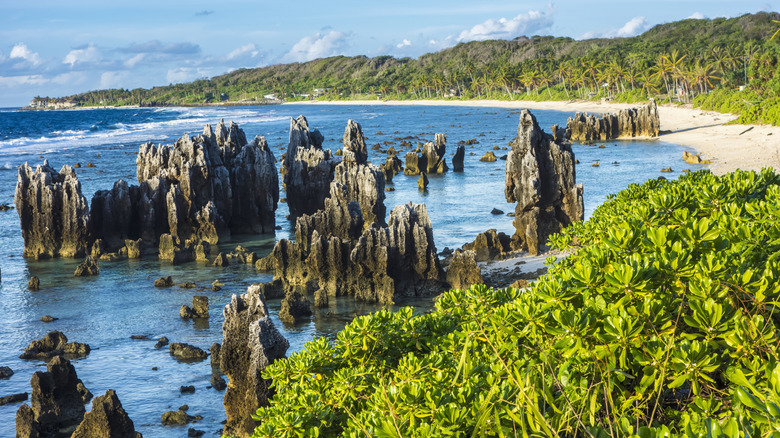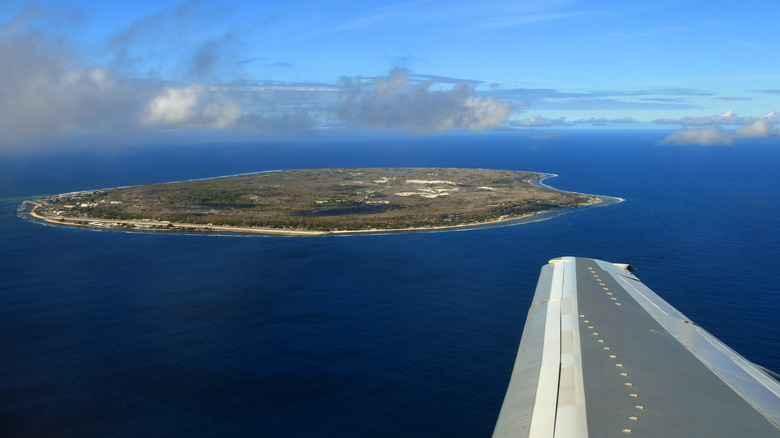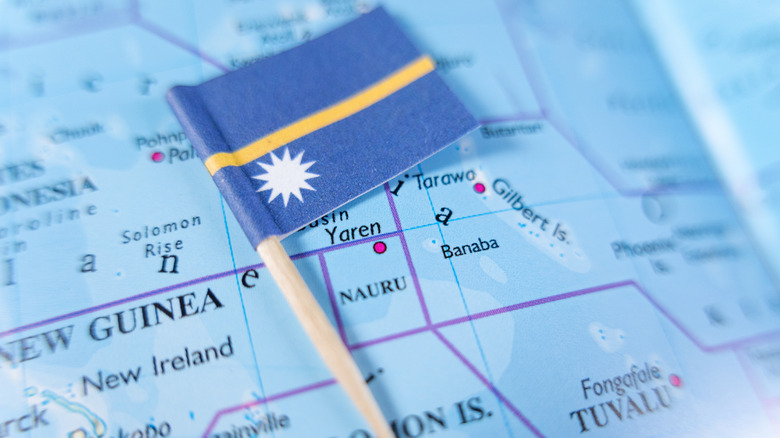This Breathtaking Pacific Island Lets You Buy Citizenship (But There's One Big Drawback)
"Golden" passports and visas have been in the news as of late, with more Americans hoping to live abroad and with the U.S. government establishing its own "golden visa" program. It seems that if you have enough money, visas or citizenship in a different country can be extremely accessible or even easy to obtain. However, even if you aren't a billionaire (which, chances are, you aren't), there are countries across the world where getting citizenship is considered pain-free, in addition to not costing an arm and a leg.
One of these happens to be Nauru, a tiny microstate in the Pacific Ocean. For the relatively low cost of $105,000 (to buy citizenship in Dominica, it'll cost around $200,000, and for a Turkish passport, $400,000), anyone who can pass a background check can purchase a Nauruan passport. The country's new Economic and Climate Resilience Citizenship Program is designed to fund the relocation of the majority of Nauruan citizens (total population: 12,300), most of whom are living in vulnerable coastal regions. Unfortunately, Nauru, an eight-square-mile island in the vast Pacific, is disproportionally impacted by climate change. The ever-rising ocean levels mean that the coastline is rapidly eroding into the ocean, which is both a bonus for potential investors (contribution to help mitigate the impact of our changing climate) as well as a potential drawback of becoming a Nauruan citizen.
Why Nauru is selling citizenship
Nauru, one of the world's least-visited countries, is a tropical island paradise. Nicknamed "Pleasant Island" by Captain John Fearn, the first European to spot the beautiful island, Nauru's isolation has kept it off the beaten path for tourism. However, the island's strategic location and its prevalent phosphate ore made it a target for colonization. The 12 tribes of Nauru descended into civil war after the arrival of Europeans in the 19th century, and the discovery of phosphate ore in 1901 devastated the island. By 2004, when the phosphate boom was over, Nauru's population was left living in a ring around the now (mostly) abandoned mine pits that had destroyed the interior, making 80% of the island uninhabitable.
Enter Nauru's new passport scheme. By opening up foreign investors looking for another passport, Nauru is hoping to fund its mass relocation efforts — the government estimates over 90% of the population needs to be moved to higher, safer land. While Nauru had a disastrous "golden visa" program in the early 2000s, the government insists only "like-minded investors" that pass the most rigorous testing will be allowed to purchase a new passport. They're framing the passport program as an innovative way to combat climate change. According to the Nauru government, "It's about joining a community dedicated to pioneering solutions for global challenges" (via The Guardian).
Pros and cons of Nauru citizenship
One of the biggest benefits of obtaining Nauru citizenship is that you'll be helping a country suffering from the impacts of climate change in real time. Other positives of a Nauru passport? Nauru is one of the most beautiful islands in the world, despite its many challenges. However, if you don't want to live there, it's not required. Finally, Nauru's passport also opens the door to many other countries, especially if your current passport is weaker when it comes to mobility, such as Thailand (80 visa-free countries), Cuba (60 countries), or Lebanon (44 countries). The Nauru passport will provide visa-free (or visa-on-arrival) entrance to 89 countries, including South Korea and the United Kingdom.
One of the biggest drawbacks, however, is in line with the purpose: climate change. The rapidly eroding coastline makes it inadvisable to build on much of the island, especially in spots with coveted coastal views. If there aren't some serious changes to the world's position on global warming and climate change, then Nauru will eventually be lost to the sea. There's no precedent for what happens to a country's citizens when it becomes completely demolished by climate change. Hopefully, it's something we won't need to find out, but could become a stark reality for Nauruan citizens and potential passport holders if we don't act accordingly.


